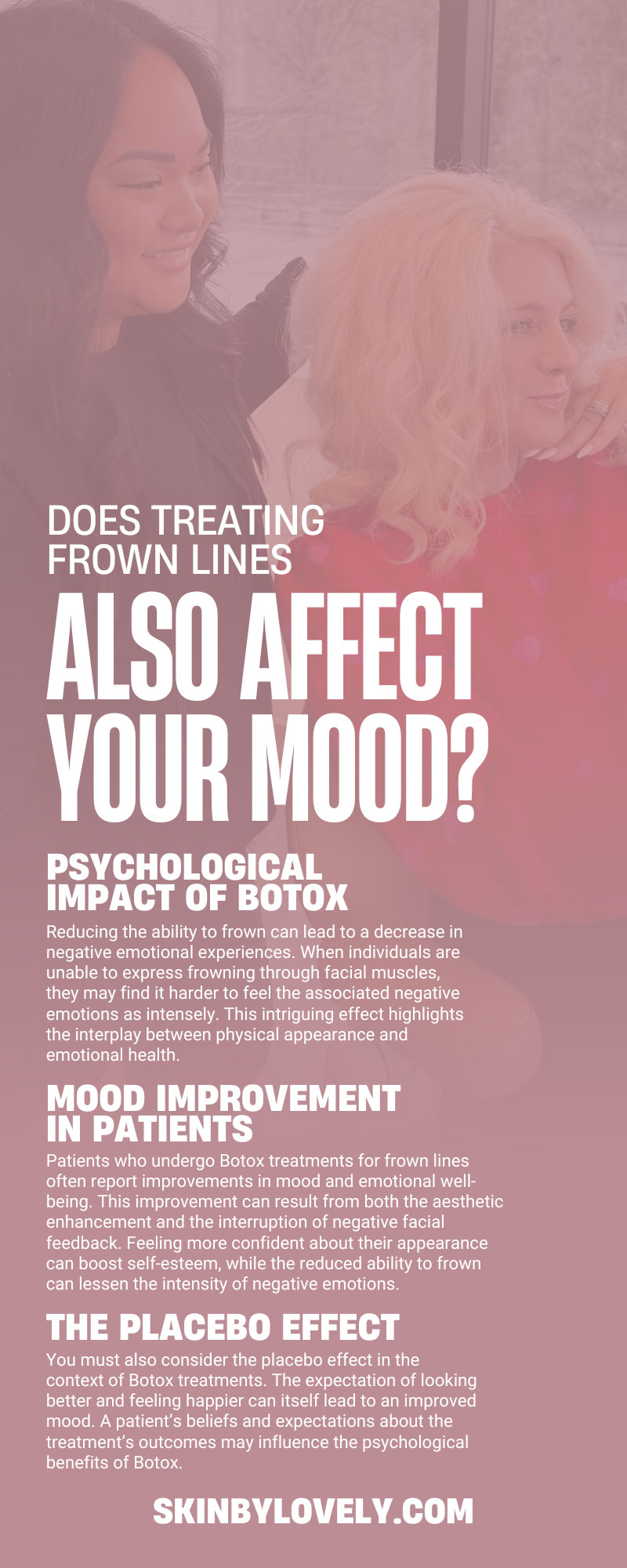Does Treating Frown Lines Also Affect Your Mood?

Frown lines, those deep creases that form between our eyebrows, are often a sign of aging or stress. But beyond their aesthetic impact, could treating frown lines also influence your mood? This comprehensive guide explores the fascinating connection between facial expressions and emotional well-being.
The Science of Facial Expressions
Facial expressions are more than just reflections of our emotions; they can also influence how we feel. This concept has roots in the facial feedback hypothesis, which suggests that facial movements can affect emotional experiences. Smiling can make you feel happier, while frowning can enhance feelings of sadness or anger. Understanding this connection is crucial in exploring how treating frown lines might affect mood.
The Role of Frown Lines
Frown lines, also known as glabellar lines, develop from repeated muscle movements and expressions of concern, anger, or concentration. Over time, these lines become more pronounced, often giving a permanent appearance of displeasure. This constant feedback of a frowning face can reinforce negative emotions, potentially impacting one’s overall mood and well-being.
Botox and Facial Muscles
Botox is a popular treatment for reducing the appearance of frown lines. It works by temporarily paralyzing the muscles that cause these lines, preventing them from contracting. This relaxation of facial muscles smooths the skin and interrupts the habitual expressions associated with negative emotions. The result is a more relaxed and pleasant facial appearance.
Psychological Impact of Botox
Reducing the ability to frown can lead to a decrease in negative emotional experiences. When individuals are unable to express frowning through facial muscles, they may find it harder to feel the associated negative emotions as intensely. This intriguing effect highlights the interplay between physical appearance and emotional health.
Mood Improvement in Patients
Patients who undergo Botox treatments for frown lines often report improvements in mood and emotional well-being. This improvement can result from both the aesthetic enhancement and the interruption of negative facial feedback. Feeling more confident about their appearance can boost self-esteem, while the reduced ability to frown can lessen the intensity of negative emotions.
The Placebo Effect
You must also consider the placebo effect in the context of Botox treatments. The expectation of looking better and feeling happier can itself lead to an improved mood. A patient’s beliefs and expectations about the treatment’s outcomes may influence the psychological benefits of Botox.
Long-Term Effects on Mood
The positive effects of Botox on mood may persist as long as the treatment’s effects last. Patients may require regular treatments to maintain both the aesthetic and emotional benefits. Those who are considering long-term use should consult with their health-care providers to discuss potential psychological impacts.
Comparing Botox With Other Treatments
Other treatments for frown lines, such as dermal fillers and laser therapy, primarily focus on aesthetic improvement without affecting muscle movement. Unlike Botox, these treatments do not alter facial expressions. Consequently, they may not offer the same mood-enhancing benefits. Understanding these differences can help patients choose the best treatment for their needs and goals.
Safety and Side Effects
Botox is generally safe when administered by a qualified professional. However, like any medical treatment, it carries some risks and potential side effects. Common side effects include mild pain, swelling, and bruising at the injection site. Serious side effects are rare but can include muscle weakness and allergic reactions. Patients should discuss their medical history and any concerns with their health-care provider before undergoing treatment.
Personal Experiences and Testimonials
Many individuals who have received Botox treatments for frown lines share positive experiences, noting improvements in both their appearance and mood. Personal testimonials highlight the dual benefits of feeling more confident and experiencing fewer negative emotions. These stories can provide valuable insights for those considering Botox as a treatment option.
The Role of Professional Guidance
Consulting with a qualified health-care provider is essential for anyone considering Botox treatments. Professionals can assess individual needs, discuss potential benefits and risks, and create a personalized treatment plan. A thorough consultation ensures that patients have realistic expectations and understand how Botox might affect both their appearance and emotional well-being.
Emotional Benefits Beyond Aesthetics
Beyond reducing frown lines, Botox can contribute to overall emotional health by enhancing self-image and confidence. Feeling good about one’s appearance can positively impact various aspects of life, from personal relationships to professional interactions. This broader perspective on the benefits of Botox underscores its potential as a tool for enhancing quality of life.
Integrating Botox With Other Therapies
For some patients, integrating Botox treatments with other therapeutic approaches can maximize emotional well-being. Combining Botox with cognitive-behavioral therapy (CBT) or mindfulness practices, for example, can address both the physical and psychological aspects of emotional health. This holistic approach ensures comprehensive care and optimal outcomes.
Future Research Directions
Ongoing research continues to explore the connection between facial expressions and emotional well-being. Future studies may provide deeper insights into the long-term effects of Botox on mood and identify new applications for enhancing mental health. Staying informed about these developments can help patients and health-care providers make evidence-based decisions.
Exploring the Benefits of Botox Cosmetic Treatments
Botox cosmetic treatments can significantly reduce the appearance of frown lines and other facial wrinkles. Beyond the aesthetic benefits, these treatments can have a positive impact on emotional well-being. By preventing the facial expressions associated with negative emotions, Botox can contribute to a more positive mood. Patients who regularly receive Botox treatments often report feeling more confident and less prone to feelings of stress or sadness. Understanding these dual benefits can help individuals make informed decisions about their cosmetic and emotional health.
Now that you know how treating frown lines can affect your mood, you can make an informed decision about whether Botox cosmetic treatments are right for you. By understanding the interplay between facial expressions and emotional well-being, you can appreciate the dual benefits of aesthetic improvement and mood enhancement. Consulting with a qualified health-care provider can ensure that you receive comprehensive and effective care tailored to your needs. Explore the potential of Botox to enhance both your appearance and your emotional health.

The post Does Treating Frown Lines Also Affect Your Mood? appeared first on Skin by Lovely.
—————
Boost Internet Speed–
Free Business Hosting–
Free Email Account–
Dropcatch–
Free Secure Email–
Secure Email–
Cheap VOIP Calls–
Free Hosting–
Boost Inflight Wifi–
Premium Domains–
Free Domains
